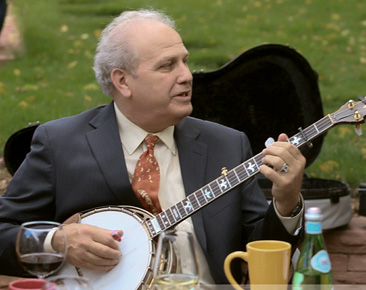
This is fun series in which we ask bluegrass music personalities, some famous, some not so famous, about some of their interests as well as about the music that they love.
 Joining me for coffee this morning is Peter Wernick, otherwise known as Dr Banjo, so called due to a best-selling banjo instruction book that he wrote, and from his advanced educational degree in Sociology.
Joining me for coffee this morning is Peter Wernick, otherwise known as Dr Banjo, so called due to a best-selling banjo instruction book that he wrote, and from his advanced educational degree in Sociology.
Peter Wernick, from New York City, joined his first bluegrass band called the Orange Mountain Boys while studying at Columbia University.
In summer 1969, he lived in Berkeley California and played with High Country and with Vern Williams and Ray Park.
The following year he moved to Ithaca, New York, to complete his Ph.D. work and do population research at Cornell University. He and his wife Joan (then known as Nondi Leonard) formed the Country Cooking band with Tony Trischka and Russ Barenberg. The band recorded three albums for Rounder and one for Flying Fish.
In 1976 the Wernicks moved to Colorado where Pete met Charles Sawtelle. The duo were to form half of the internationally-acclaimed Hot Rize (with Nick Forster and Tim O’Brien). The group stayed together for 12 years, taking the first IBMA award for Entertainer of the Year in 1990, the year they disbanded. They released 10 albums during that time.
Though reuniting for several shows a year throughout the 1990s, the classic Hot Rize lineup came to an end in 1999 with the death of Charles Sawtelle. The band re-formed in 2002 with Bryan Sutton on guitar and resumed playing a handful of shows each year, with an increase of activity culminating in the 2014 release of their first studio album in 24 years, When I’m Free, with all new material.
What would you like to drink?
“Well, how about some … coffee?? I take it with milk, sugar and a spoon.”
Do you want anything to eat as well?
“Yes, I want a scone, but am trying to lose weight, so I’ll pass. Well, maybe one bite.”
What’s your favorite food?
“Hmm, tough choice… New York style pizza, my wife’s pot roast, coconut custard pie… I better stop thinking about these things!”
And what would you have to drink with that?
“Sparkling water with lime. Refreshing!”
What’s the nicest meal that you have ever had?
“Believe it or not, the breakfast at our hotel in St. Petersburg, Russia, a few years ago stands out… They had just about everything I could think of, fresh and delicious, fruits, breads, fish, couldn’t be better. And a few nights later, after our performance (at the first Russian Bluegrass Festival) in Vologda was another meal to remember… they just kept bringing food of all different sorts, and topped it off with some extra-good local ice cream they’re famous for.”
Let’s talk bluegrass…..
“No, let’s keep talking about food!!”
Where/when did you first hear bluegrass music?
“A friend in the Bronx, New York, played me a cut from Flatt & Scruggs’ album Foggy Mountain Jamboree. It was Shuckin’ the Corn, still my favorite Scruggs tune. And it just blew me away. I asked my friend, ‘That’s ONE guy playing the banjo??’ It seemed impossible and it sounded so good. I was 12.”
Which of your own songs do you have a particular liking for?
“Just Like You means a lot to me because it means a lot to other people. Two bands I was in didn’t especially pick up on it at first, but when Hot Rize started doing it, people reacted strongly. It’s been recorded by about 20 different groups now. That kind of reaction makes me value the song that much more. I wrote it when I was 29, while driving home from a bluegrass festival. I had the whole thing in my head and when I got to a truck stop, just wrote it all down on a napkin—which I still have.
Besides that, I really enjoy some tunes that I’ve recorded with my Flexigrass band that expand on bluegrass banjo techniques and have neat chord progressions: Haystack Rock, and Waiting for Daylight. I’m also fond of Ruthie, a completely true song I wrote in tribute to my parents.”
What about a song written by someone else?
“I think The Wichita Lineman is a simply beautiful song. I just melt when I hear Glen Campbell sing it, and I also have a banjo arrangement in a kind of bluegrass tempo, which Hot Rize does sometimes, with Tim singing. And I’m a huge Beach Boys fan. I love Brian Wilson’s singing and writing, and Sail On Sailor really gets me.
Which particular album do you like best and why?
“If you mean ones I’m on, it would be So Long of a Journey, by Hot Rize. That was recorded live, when we didn’t know we were being recorded, and it has a lot of spontaneous energy, applied to songs we’d already recorded in the studio over the years. But the stage energy makes me like the versions on that record better than the originals recorded in the dry studio environment. I’m thrilled to hear how tight and strong the band sounds on that record.”
What’s your favorite bluegrass project of all time and why?
“That’s easy… I think Foggy Mountain Jamboree is just a sensational album. Scruggs is like a miracle— at the top of his game, as is the whole band. Some great classic stuff on there, great recording, and I even love the cover, with Lester and Earl popping with energy and looking sharp in their white jackets, cowboy hats and red string ties. That record lit me up from the first and still does.”
You play a banjo… What model is it?
“A Gibson Granada made for me by Greg Rich in 1988. I’m the only owner. The neck was broken in the airplane crash I was in the following year, and the replacement neck has RB-1 style inlays, to match the banjo I’d been playing before the Granada.”
Of all the instruments that you have owned what’s your favourite Instrument?
“The Granada. I’ve played it full time for 26 years now.”
What’s your favourite bluegrass memory?
“Wow, I have so many. I guess it’s between attending the first bluegrass festival (Fincastle, Virginia, 1965) where I really “bonded” with bluegrass, and interviewed the Stanley Brothers, Jimmy Martin, and Don Reno… and presenting the IBMA Youth Bluegrass All-stars in 1993, my “dream team band of 12 year-olds” including Chris Thile, Michael Cleveland, Josh Williams and Cody Kilby…. AND…. singing trios backstage at Merlefest with Tony Rice and Chris way late one night… AND playing Foggy Mountain Breakdown with Earl Scruggs and Steve Martin on the David Letterman show in 2005. I was nervous but did OK. What a thrill to be up there with Earl!”
How do you keep fit and healthy when you spend so much time on the road?
“Well, I stay up late and smoke a lot of pot… mostly I try to rest when I get home and take naps as necessary. At home I work out three times a week and do a lot of strenuous yard work on my property in Colorado. I eat a lot more sensibly than I used to, drink lots of water, watch my calories. Easy on the pizza, and no donuts!”
Are you a sports fan? Who do you follow?
“I used to be a real Yankee fan when I lived in the Bronx, but I don’t have any favorite teams. I like watch sports on TV now and again but I don’t care who wins. I like playing tennis and used to love playing baseball and basketball.”
What hobbies do you have?
“My main hobby is taking care of my land. We have over two acres with beautiful trees and a creek going through it, and it takes a lot of mowing, pruning, hauling, etc. to keep it as beautiful as possible year-round. I just love being at home on my land. All our firewood comes from our trees, which I cut.
What is your favorite film and why?
“My favorite movie is Forrest Gump. It’s funny and heartwarming and wise, and a lot of the history it covers resonates with my own life.”
Do you get much time to watch TV?
“When I watch TV it’s mostly news shows. My favorite is Sunday Morning on CBS, with Charles Osgood. He covers mainly uplifting stories that make you think and show people with good values trying to do well in the world, or excelling at something special. I wish there were more things like that on TV instead of all the violence and mayhem and paranoia. I like peace and love and seeing the powers of human potential! And my wife and I love to watch nature shows with great photography. Puts you in touch with the miracles of life on earth.”
What would you be doing if you weren’t involved in bluegrass music?
“Well, I was a professional sociologist with a good job at Cornell, before I jumped ship and went into music full-time. I am always looking at things as a sociologist, whether as a profession or not. I find it interesting to study why people do things. There’s “a lot of sociology in bluegrass” and I like to puzzle it all out. I also like to teach. I’ve done some teaching of English as a second language to Mexican people, and would probably do more of that.”
Wernick started his famous Colorado-based banjo camps in 1985 at the suggestion of Fred Bartenstein.
Prior to that Wernick‘s first experience teaching a week-long camp was in 1980 at Cannon Beach, Oregon, where there was a summer “adult ed” program run by Portland State University. Among his 20 students was the then-15 year old Mike Bub.
In 1992 he formed an experimental bluegrass/classic jazz band, Pete Wernick’s Live Five, later known as Flexigrass, and starting in 2009 has played with Long Road Home, a traditional bluegrass band.
In 2004, a tune, entitled Big Rock in the Road, from his album Dr. Banjo Steps Out, was played on the planet of Mars to “wake up” NASA’s landing craft Spirit Rover on February 27, making this the first bluegrass tune to be heard on another planet.
In 2010 he received a Distinguished Achievement Award from the IBMA, for which organisation he served as its first president.
Wernick, who is an outspoken advocate of atheism, served in the 1990s as president of the Family of Humanists.
A survivor of a United Airlines DC-10 air crash, he has lived in Niwot, Colorado since 1976.







